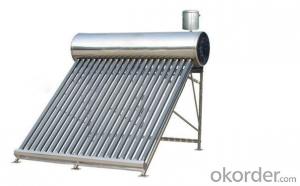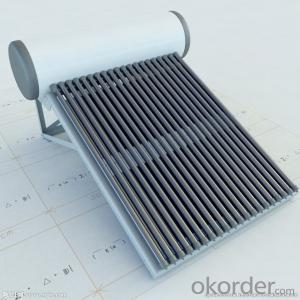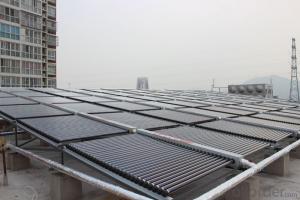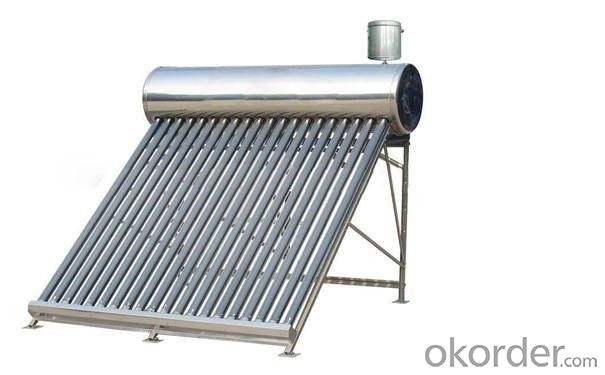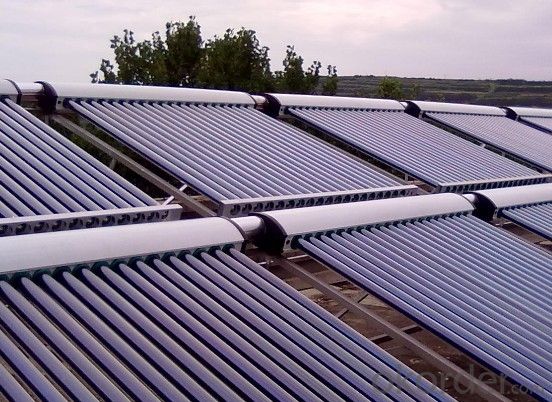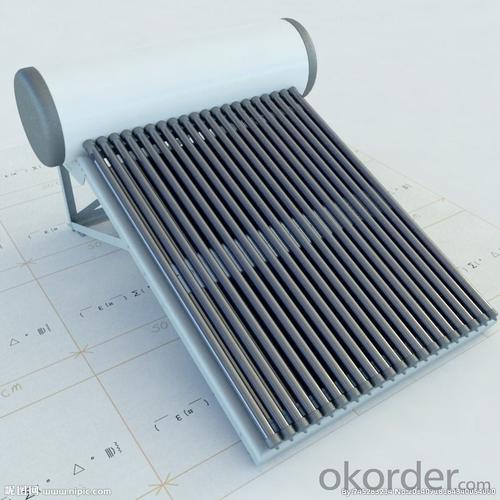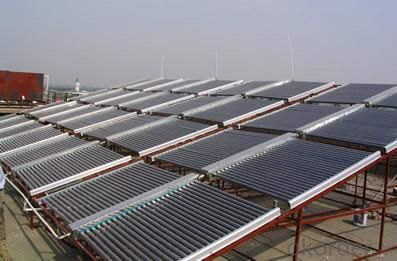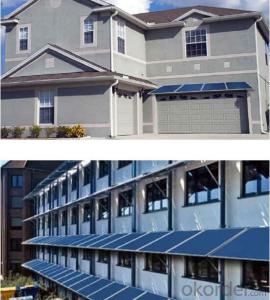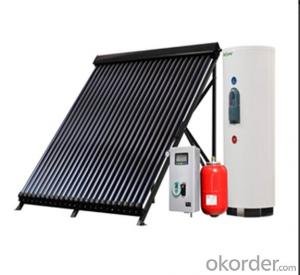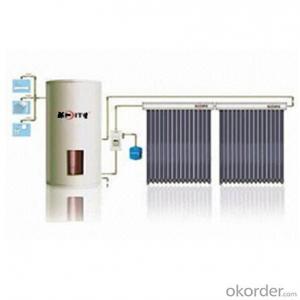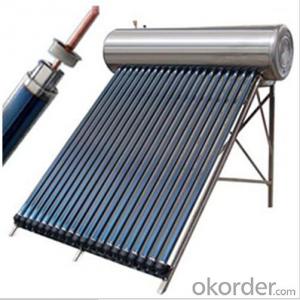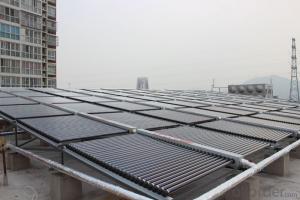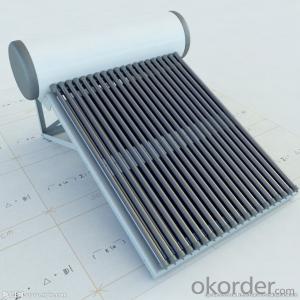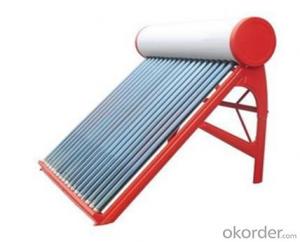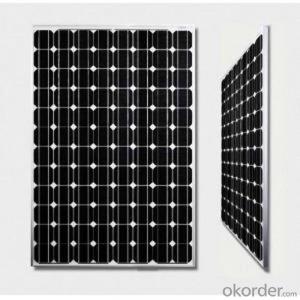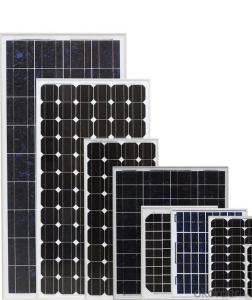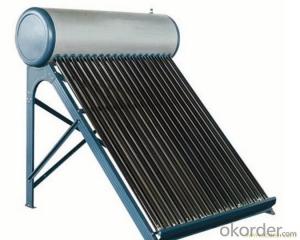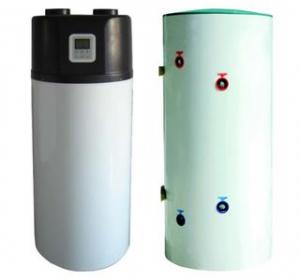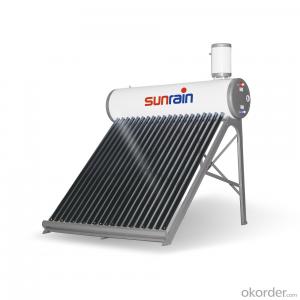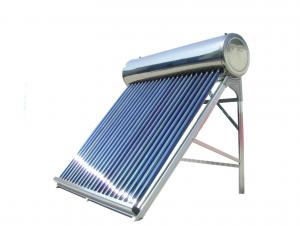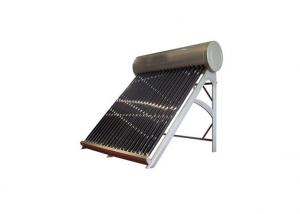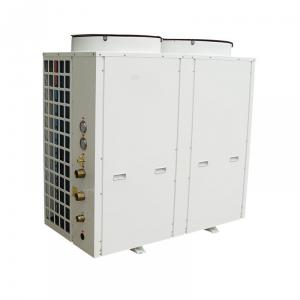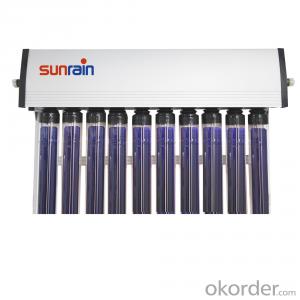250L-300L Solar Water Heater for Trough - China Famous Brand
- Loading Port:
- China main port
- Payment Terms:
- TT OR LC
- Min Order Qty:
- 10 set
- Supply Capability:
- 10000 set/month
OKorder Service Pledge
OKorder Financial Service
You Might Also Like
Solar water heaters features
1. The upright tank can make the water temperature to a high level. It can hot the water instantly
2. The tank inside the building, the hot water loses less energy than the normal one
3. The solar collector and the tank of solar water heater is separated, that makes the system combine with the building perfectly, which will reduce the sightseeing for the building and environment around
4. Back up with electric heater so that in the day without sunshine hot water can also be used
5. Can be combined with gas or electric heater
6. Max. Pressure: 12bar; Operating Pressure: 6 bar
7. It can be used for other function, such as warming
Solar water heaters working principle
1. The solar collector absorbs solar energy and transmits it to the solar water heater tank through circulation
2. When the temperature of the collector reaches the set value, the controller starts the circulation pump automatically
3. The circulation pump makes heat-conducting liquid circulate automatically
4. The heat-conducting liquid transfers heat to water by lower heat exchanger in the water tank.
5. When the temperature difference between solar collector and heat pipe solar water heaters tank doesn't reach the set value, the circulation pump will be shut automatically
6. In case the temperature of the water tank does not reach Tmax, Electric Heating Element will start to work automatically
Solar water heaters working station component:
1. Operating screen
2. Manometer
3. Pump speed adjust switches
4. Temperature difference circulation pump
5. Flow rate indicator
6. Return circuit connector
7. Safety valve
8. Expansion vessel connector9. Return circuit connector
10. Wall mounting
11. Expansion vessel:8L
12. Pressure resistance: 10 bar pressure for expansion vessel
Solar water heaters specification:
Description | solar water heaters |
Material of out manifold | 0.55mm thickness color steel/ fluorine carbon steel |
Material of inner tank | Food grade 2.0 mm thickness SUS304 stainless steel |
Tank insulating layer | 40mm 45kg/m³ high-density polyurethane foamed |
Inlet and outlet hole | Male G1'' |
Max pressure | 0.6 Mpa |
Solar collector tube | 3.3 Borosilicate glass with N/Al coating |
Thickness of glass tube | 1.6mm |
Vacuum tube tightness | P≤0.005 Pa |
Absorption | as=0.93-0.96 (AM1.5) |
Emission ratio | εh=0.04-0.06 (80C±5C) |
Idle sunning property parameters | Y=220~260m2.C/KW |
Average heat loss coefficient | ULT=0.6~0.7W/(m2.C) |
Bracket: | 2.0mm thickness aluminum alloy |
Tank weight | 75KGS |
Tank size | 560mm Dia x 1810mm Height |
Tank capacity | 300L |
Solar collector | 2pcs 58x1800x15tube solar collector |
Absorber area | 2.811 m² |
Working station | SP116 working station |
Heat exchanger length | Upper:12m, Underside:18m |
Solar water heaters details show:
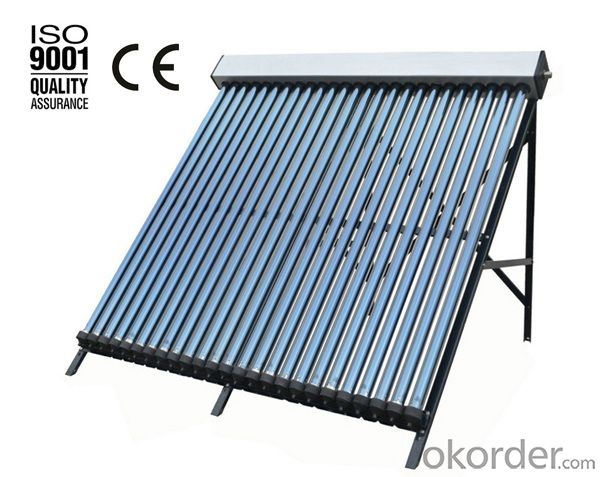
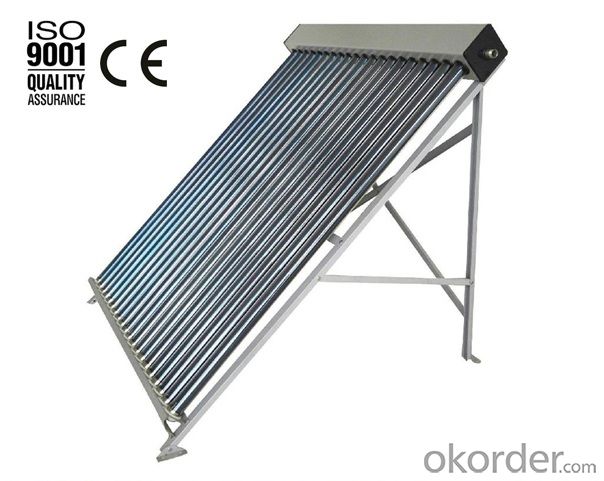
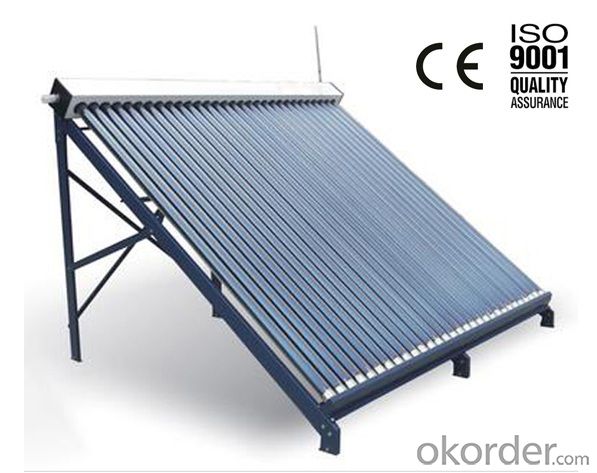
Benefits of this kind of solar water heaters:
1. Prolong the life of your existing water heater
2.Costs less than an electric, gas or oil water heater
3.No maintenance required
4.Lasts longer than a traditional hot water heater
5.Reduce your water heating costs
- Q: How does a solar water heater impact the water quality deterioration over time?
- A solar water heater does not directly impact water quality deterioration over time. Unlike traditional water heaters, solar water heaters do not use fossil fuels or produce emissions that can potentially contaminate the water supply. However, the overall water quality can still be influenced by external factors such as the condition of the water source, maintenance of the solar water heater system, and the quality of the materials used in the system's construction. It is essential to regularly monitor and maintain the solar water heater to ensure optimal performance and water quality.
- Q: What is the impact of corrosion on the performance of a solar water heater?
- Corrosion can significantly affect the performance of a solar water heater. It can lead to the degradation of components such as the collector tubes, tank, and pipes, causing leaks and reducing the efficiency of heat transfer. Corrosion can also clog the system, hindering the flow of water and decreasing the overall effectiveness of the heater. Regular maintenance and proper corrosion prevention measures are essential to ensure optimal performance and prolong the lifespan of a solar water heater.
- Q: How does the size of a storage tank affect the performance of a solar water heater?
- The size of a storage tank can directly impact the performance of a solar water heater. A larger tank allows for increased storage capacity, which means more hot water can be stored and used when needed. This is particularly beneficial during times of low sunlight or high demand for hot water. On the other hand, a smaller tank may result in limited hot water availability, especially during periods of insufficient sunlight or high hot water usage. Therefore, choosing an appropriate tank size is crucial for optimizing the performance and efficiency of a solar water heater.
- Q: How wide is the solar water heater?
- The width of the solar energy depends on the number of vacuum tubes, and now the market for the sale of the brand of solar energy has sixteen tubes until the tube has thirty-six. The width of the smallest one meter a little more than the widest reach nearly three meters.
- Q: I say that solar water heater is completely dead Oh, summer bath at home occasionally found there will be showers and boiling water handle, when hand feel obvious tingling feeling, that is not a strong current power to feel. This is clearly not the power of the ah, how can there be a feeling of electric shock? Trouble you can answer it, very confused ah! Thank you
- There is a feeling of electricity, what is your home electrical appliances or wires have been leakage. Your home is now the water pipe, the pipe has been connected to your home ground, so it will not kill, just let people numb.
- Q: Can a solar water heater be used in areas with strict building height restrictions?
- Yes, a solar water heater can be used in areas with strict building height restrictions. Solar water heaters are typically installed on rooftops, which are not usually subject to height restrictions. Additionally, solar water heaters are generally compact and unobtrusive, making them a suitable option even in areas with strict building regulations.
- Q: I am a rural child, the family is not very richBut for some reason, they often need enough hot water, but considering the convenience and price factors and their life, can not make a choice, so I hope with the help of the Internet, the relevant experts and netizens friends with give a reasonable answer! Thanks!!!
- Recommended to choose electric water heater, less investment, easy to use.Electric water heater in the installation, wire control switch can be completely hidden, semi hidden, more beautiful, but consumers should pay more attention to the safety issues such as wire.
- Q: How does the performance of a solar water heater compare to a traditional water heating system during peak demand periods?
- During peak demand periods, the performance of a solar water heater can vary depending on factors such as the availability of sunlight and the size and efficiency of the system. In general, solar water heaters can be quite effective during peak demand periods as they harness solar energy to heat water, reducing reliance on electricity or fuel. However, if there is limited sunlight or the system is not properly sized or maintained, a traditional water heating system may perform better during these periods.
- Q: Can a solar water heater be used in areas with high temperatures?
- Yes, a solar water heater can be used in areas with high temperatures. In fact, solar water heaters are particularly effective in such areas as they can harness the abundant sunlight to heat water, reducing the reliance on conventional energy sources. The high temperatures enhance the efficiency of the solar collector, allowing for greater heat transfer and faster water heating.
- Q: A sun rain licensing solar water heater manual electric heating, overflow, can not automatically stop Sheung Shui, what is the reason?
- Probe failure. This is one of the most common causes. Instrument through the control solenoid valve to control the automatic water supply and automatic water off the solar water heater, the premise is that the feedback signal to the instrument must be correct. If the feedback signal from the probe is wrong, then the command given by the instrument is also wrong. If the probe fails, when the water in the water tank is full, the signal feedback to the probe instrument is still not full, instrument commands were solenoid valve to open, that is to continue to water, then the water will overflow through the stomata. How to determine the reason for the failure of the probe? Very simple, if the water tank overflow, then the meter has not been full of water level, it can be judged that the probe failed. The solution, of course, is to replace the probe.
Send your message to us
250L-300L Solar Water Heater for Trough - China Famous Brand
- Loading Port:
- China main port
- Payment Terms:
- TT OR LC
- Min Order Qty:
- 10 set
- Supply Capability:
- 10000 set/month
OKorder Service Pledge
OKorder Financial Service
Similar products
Hot products
Hot Searches
Related keywords
